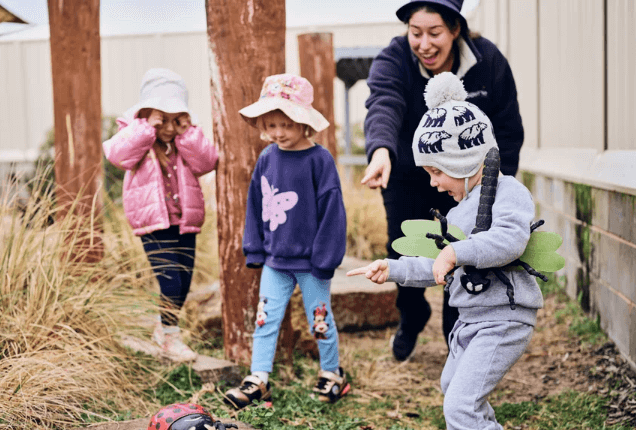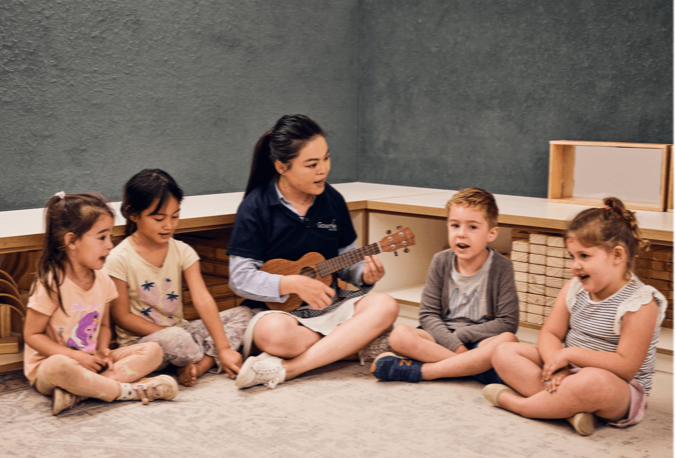Preschool and Early Education : Gowrie NSW

Why Gowrie NSW?
For more than 80 years, Gowrie NSW has been at the forefront of early childhood and preschool education in Australia. Set within the context of innovative spaces alongside nurturing educators, our early education and preschool programs encourage children to grow to their full potential.
If you’re embarking on the journey of enrolling your child in preschool education, we invite you to learn more about our unique approach to preschool education.

WHAT IS PRESCHOOL?
With 13 years of formal education still to come, you may think that preschool is a teaser to ‘big school’. But preschool programs are so much more than just the step before primary school.
Preschool is where children form their first friendships with peers and develop bonds with adults outside of their immediate family. At preschool, children learn through play, making new discoveries every day.
The years children spend in preschool and early childhood education are some of the most important of their life. And at Gowrie NSW, we don’t take that for granted.

Different Types of Preschools
There is no one type of preschool or preschool program in Australia. Some follow particular child care or educational philosophies such as Reggio Emilia. Others, called sessional preschools, may only run for a few hours a day.
At Gowrie NSW, some of our preschool programs are offered within our early education and care centres - the benefit of our preschool programs within our EEC's is that your child is accessing a readiness for school program, with the added bonus of long daycare hours.
We also have dedicated pre-schools that operate during school hours (usually 9 - 3). These are funded under the Start Strong Preschool' NSW State Government initiative. Most 3 - 5 year old children are able to access 15 hours of fee relief per week in the year leading up to school.

What is Play-Based Learning?
Play-based learning is a term you’ll hear a lot in relation to preschool services. The Early Years Learning Framework that underpins preschool curriculums is based upon the concept of play-based learning. And that’s because children of all ages really do learn through play.
At Gowrie NSW, our focus is on intentional play-based learning. That is, we use play as a tool to support the children’s learning. We create environments where play can thrive as the children make new discoveries and explore the world around them.

What are the benefits of preschool?
Preschool helps a child’s development in so many ways. It’s an environment purpose-built for their learning by people trained in early childhood education.
Some of the benefits of preschool include:
- preparing children for the transition to kindergarten with school readiness skills
- improving communication skills with other children and adults
- Establishing early friendships
- increasing autonomy, independence, self-esteem and confidence
- developing gross motor skills, such as jumping and climbing, and fine motor skills, such as drawing and cutting
At Gowrie NSW, our educators strongly believe in the importance of the preschool years. We see it as our job to foster a love of learning in a fun and nurturing environment.

What Does a Program for Preschool Look Like?
Preschool at Gowrie NSW is exciting and engaging. The children make new discoveries every day. And they have fun in the process.
During a typical day at a Gowrie NSW preschool you could expect your child to do the following types of activities:
- playing with puzzles and games
- art and craft such as painting, drawing
- building with blocks
- role-playing activities and dressing up
- sensory play with play dough, clay and sand
- reading books
- dancing and playing music
- running, jumping and playing outside
It's through these activities that children learn. By exploring their environment they learn how things work and how to approach life with a curious mind. By collaborating with their peers they learn how to communicate and develop their social skills.
Their vocabulary grows, as do their fine and gross motor skills and so much more. Importantly, they start to develop an understanding of who they are and how they fit into the world around them.
Our Approach to Preschool at Gowrie NSW
The beauty of our preschool program is that it’s designed to allow children to learn at their own pace. They can immerse themselves in their own interests and develop their skills in their own way alongside their peers.
Our preschool approach is built on a foundation of respectful relationships. We build strong connections with the children and their families to support each child in the way that best suits their needs.
Our program is intentionally play-based to empower children to reach their full potential. Our educators stay up to date with developments in early childhood education to ensure we adapt and evolve in line with the latest research.
As we prepare your child for the next step in their education in primary school, we strive to leave a lasting impact. This impact is the foundation that will set them up for success at school and beyond.
Preschool Programs

Indoor Learning Experiences
Our preschool classrooms use soft colours and natural materials to create warm and calming learning spaces. The children have access to puzzles, games, blocks, books, craft resources and more to enhance their learning activities. Imaginative play is actively encouraged and every child is respected for the unique interests and personality they bring to the classroom.

Outdoor Learning Experiences
The outdoor learning environment is central to our preschool program. Leafy and green, we provide the children with opportunities to learn about and engage with the natural environment. From sand and water play to climbing and swinging, the outdoors is the perfect playground for our play-based learning approach.

Group Learning Experiences
The benefit of preschool is that it gives your child the opportunity to interact with their peer group. We encourage the development of social skills, collaboration and communication by planning group learning activities. These might include musical activities such as dancing and singing, storytime or show and tell.
.png)
What Is the Preschool Age?
In NSW, children who turn four before 1 August of the year before they start school can attend preschool. In ACT, the cut-off is 1 May.
At Gowrie NSW, our preschool streams cater for children aged 3 to 5 years. The benefit of attending preschool from 3 years of age is that children have extra time spent in intentional play-based learning before they start school. That extra time allows them to make important discoveries and develop their skills and independence.

What is the Difference Between Kindergarten and Preschool?
In NSW and ACT, Kindergarten is the first year of formal schooling. Preschool is the step before this and caters to children aged 3 to 5 years.
Both Kindergarten and Preschool provide children with an educational environment. The biggest difference is that Kindergarten is set with the formal structure of the education system. Preschool on the other hand is play-based and flexible to suit children’s individual needs.
It’s also important to differentiate between long daycare and preschool. Long daycare is available for infants from 6 weeks of age up until a child goes to school. While some long daycare centres offer a preschool program, this isn’t always the case.
Preschool programs are taught by a qualified teacher, which isn’t always the case in a long daycare setting.
.png)
Inclusion and Care at Gowrie NSW
Gowrie NSW is proud to deliver the NSW/ACT Inclusion Agency as part of the Inclusion Support Program.
We work within our centres to identify barriers to inclusion as well as the strengths of our service.
We are proactive in analysing and improving policies, programs and practices that can support inclusion and children with additional needs.
We also work closely with parents and families to ensure that the needs of each individual child are met.
.png)
Preschool Activities and Games
Children learn through play. In play, they can comfortably and confidently explore new concepts and practise new skills.
The term play-based is so often misunderstood. That’s why we talk about intentional play-based teaching in our Gowrie NSW programs. We use play as a tool to teach and support children’s learning across all areas of their development - social, emotional, physical and cognitive.
We do this through different games and activities that are linked to clear learning outcomes.
.png)
Preschool Fine Motor Activities
As adults, we take our fine motor skills for granted. We use them every day when we write with a pen, do up our buttons or use a knife and fork to eat a meal. These skills use the muscles in our hands and fingers to grip, grasp, pinch and hold.
Fine motor skills don’t just help children to learn how to write or hold a pair of scissors. They underpin their confidence and social skills, help with their hand-eye coordination and improve their physical awareness.
Children aren’t born with fine motor skills. They develop them over time. We focus on embedding fine motor activities for preschoolers into our program so their fine motor skills become like second nature. Some of the fine motor activities we incorporate into our preschool program include:
- Playing with playdough
- Threading beads onto a string
- Using tweezers to pick up small objects
- Serving food with tongs
- Digging in the sandpit
- Sorting small objects into different categories
- Cutting shapes with scissors
- Finger puppet play
These activities are fun for the children. They enjoy playing with playdough or the challenge of serving their own food at lunchtime. But the activities are also intentional and designed to give the children the skills they need to succeed in life.
.png)
Preschool Maths Activities
At preschool, we start to teach children basic mathematical reasoning and maths concepts. While there is a cognitive and academic benefit to these types of maths games for toddlers, there’s more to maths activities than learning how to count.
The types of maths activities we do in preschool help the children to learn problem solving skills. They learn how to recognise patterns and develop spatial awareness. They learn important life skills, such as how to measure an object and the concept of making calculations to support decision making.
Loose parts play is one of the tools we use for our maths activities. The children collect objects, count them, sort them into categories, identify shapes and create patterns. Other maths activities include:
- Playing games involving dice
- Singing counting songs
- Cutting out shapes
- Measuring ingredients while cooking
- Lining up toys from shortest to tallest
- Reading counting books
These activities may not seem like typical maths activities but they are teaching the children early numeracy skills. The activities are chosen intentionally by the educators to support the children’s learning.
Gowrie NSW Preschool Locations
At Gowrie NSW we consider the whole child in the context of their family and their community. Through our strong educator relationships and high-quality curriculum, we tailor the program to suit the needs of each individual child. At Gowrie NSW preschools, children thrive and flourish into capable and confident learners ready to hop, skip and jump into big school.
Our preschools operate across NSW and ACT. With options for both dedicated preschools and preschool programs embedded into our early education and care centres, we offer choice and flexibility to families. All of our centres follow the same core beliefs and practices while still reflecting the uniqueness of the community, children and families that use the preschool services.
Learn more about our centres to discover how Gowrie NSW can nurture your child's potential.









